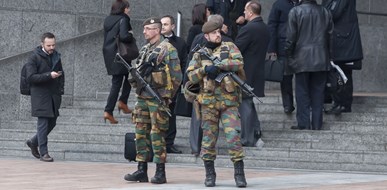The dynamic between terrorism and counter-terrorism and the quest for legitimacy in the eyes of the public
Published 24 July 2019
©Shutterstock
How do terrorists aim to attract attention and support for their claimed goals? How do states attempt to undermine the legitimacy claims of the terrorists and endeavour to gain or regain public trust and confidence?
These are only some of the questions one of our top speakers, Professor Isabelle Duyvesteyn, will delve into during her lecture at the Advanced summer programme on terrorism, counter-terrorism and the rule of law. The programme, hosted by International Centre for Counter-Terrorism (ICCT) and T.M.C. Asser Instituut in The Hague from 26 – 30 August 2019, explores the latest international and domestic trends of terrorism and counter-terrorism.
Duyvesteyn is professor of International Studies and Global History at the Institute of History at Leiden University and has recently written a book chapter together with Bart Schuurman titled ‘(Counter) Terrorism and Public Support’ which investigates the central battleground in the terrorism - counter-terrorism dynamic and the quest for legitimacy in the eyes of the population.
We are delighted to welcome Prof. Duyvesteyn as one of our speakers during the summer programme.
About the programme
During an intensive week, experts, academics and practitioners will explore international and domestic legal aspects of counter-terrorism. Participants will get the chance to have a unique and in-depth look at the challenges that come with adopting and implementing counter-terrorism measures, while ensuring respect for human rights, fundamental freedoms and the rule of law. For more information about the programme and registration click here.
Biography Isabelle Duyvesteyn
Isabelle Duyvesteyn is Professor of International Studies/Global History at the Institute of History at Leiden University. She completed her PhD at the Department of War Studies at King’s College in London. Previously she has worked at the Royal Military Academy in the Netherlands, the Netherlands Institute for International Relations and the Department of History of International Relations at Utrecht University. She is an Aspasia and VIDI laureate. Between 2012 and 2017 she held the Special Chair in Strategic Studies at the Political Science Institute of Leiden University. She is a member of the national Advisory Council for International Affairs assigned which advises the Netherlands government on issues of peace and security, a member of the Scientific Advisory Board of the Netherlands Defence Academy. She is a member of several book and journal editorial boards, notably the Journal of Strategic Studies, Small Wars and Insurgencies and Atlantisch Perspectief. Her most recent publications include an edited volume Rebels and Legitmacy; Processes and Practices (London; Routledge 2018) and a book chapter together with Bart Schuurman, ‘(Counter) Terrorism and Public Support’, in: Andrew Silke (ed.) The Routledge Handbook of Terrorism and Counterterrorism (London: Routledge, 2018).
Further reading
Countering terrorism through the stripping of citizenship: ineffective and counterproductive
In this perspective, Dr Christophe Paulussen examines the scope and nature of citizenship stripping as a counter-terrorism measure and argues that it stands out in comparison to other counter-terrorism measures. This is because of its highly symbolic nature, its far-reaching effects, as well as its emphasis on ‘addressing’ the problem by making it the problem of other states. (ICCT Perspective, 2018)
Should Europe uphold the right to return even for Daesh families?
European powers are yet to claim their citizens, who want to return home from former Daesh-held territories in Syria, posing a significant question over whether the legal principle of the right to return will be applied. An interview in TRT World, featuring Dr Christophe Paulussen.
Research Fellow Christophe Paulussen and Rumyana van Ark on dealing with foreign terrorist fighters (French)
See comments by Asser Researchers and ICCT Research Fellows Christophe Paulussen and Rumyana van Ark in this article by Radio Canada on how to deal with returning foreign terrorist fighters. Both Christophe and Rumyana discuss how states should assume their responsibilities in handling these cases.
‘Legislative fever is not a long-term solution for stopping terrorism incitement’
Legislators and policy-makers should put more emphasis, expertise, and resources towards resolving the root causes of terrorism, rather than trying to curb the spread of extremism by feverishly expanding counter-terrorism legislation. That is the main conclusion of a new ICCT Perspective ‘Incitement to Terrorism – Treating the Symptoms or Addressing the Causal Malady?’ by Asser researcher and ICCT research fellow Dr Rumyana Grozdanova.
Policy brief: ‘Counter-terrorism measures need to be evaluated’
Read the full policy brief in which Asser researcher Dr Berenice Boutin discusses methods for evaluating counter-terrorism measures and provides suggestions for policy-makers.
